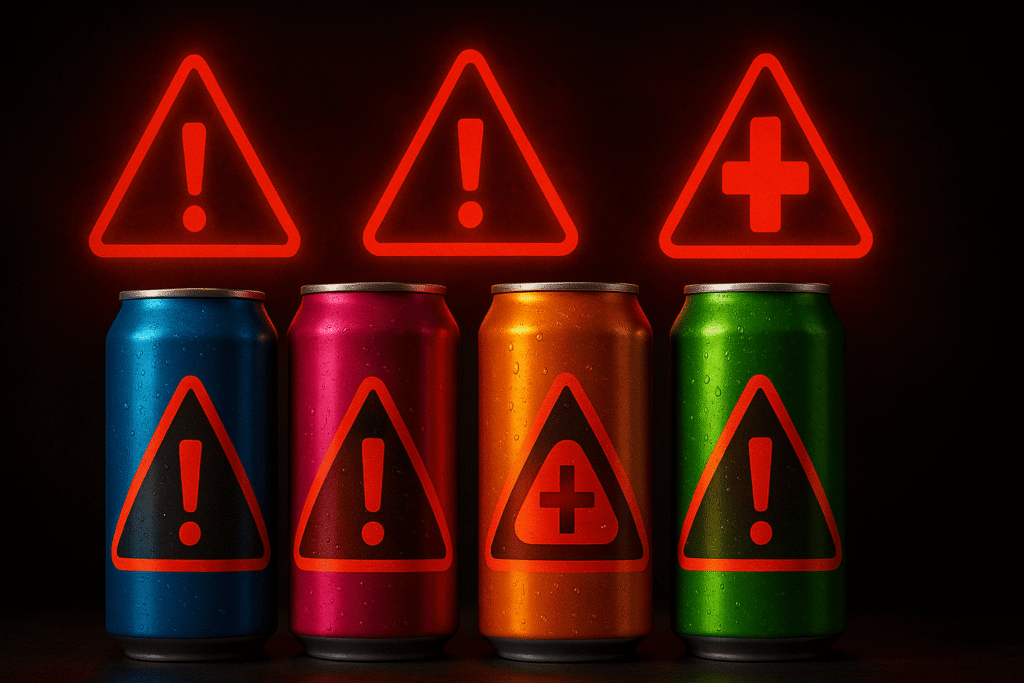Energy drinks have become a ubiquitous part of modern life, promising instant energy and enhanced performance. However, beneath their flashy marketing and appealing flavors lies a dangerous cocktail of ingredients that could be slowly destroying your health. With emergency department visits related to energy drink consumption doubling in recent years and over 5,000 poison control calls annually, it’s time to examine the serious health risks these beverages pose.
What Are Energy Drinks and Why Are They So Popular?
Energy drinks are caffeinated beverages that combine high levels of caffeine with sugar, amino acids, and herbal stimulants like taurine, guarana, and ginseng. Unlike traditional soft drinks, these products are marketed as performance enhancers and energy boosters, targeting everyone from students cramming for exams to athletes seeking competitive advantages.
The global energy drink market has exploded to over $12.5 billion, with projections reaching $21.5 billion by 2027. This growth is fueled by aggressive marketing campaigns that specifically target vulnerable populations, particularly adolescents and young adults, with approximately 30-50% of this demographic consuming energy drinks regularly.
The Deceptive Marketing Machine
Energy drink companies spend millions on marketing campaigns designed to appeal to youth through:
- Celebrity endorsements on youth-focused networks
- Sponsorship of extreme sports and gaming events
- Social media campaigns targeting teenagers
- Strategic placement in convenience stores and schools
This targeted marketing creates a dangerous misconception that energy drinks are safe, effective, and necessary for peak performance.
The Toxic Cocktail: Understanding Energy Drink Ingredients
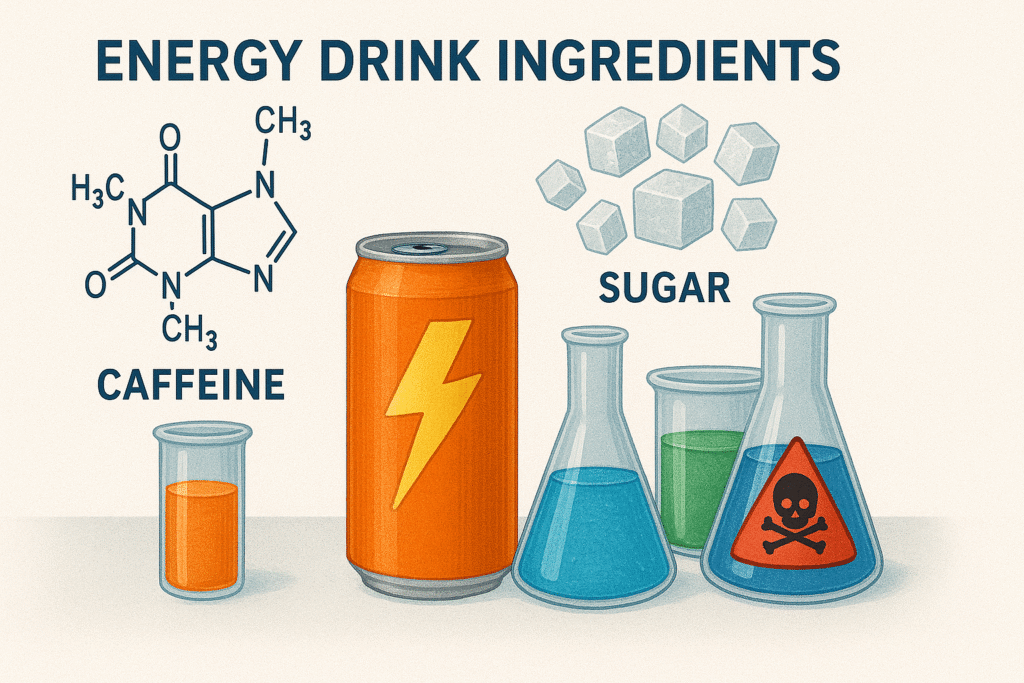
Caffeine: The Primary Culprit
The most dangerous aspect of energy drinks is their extreme caffeine content. While a typical cup of coffee contains 95mg of caffeine, energy drinks can contain anywhere from 38mg to over 500mg per serving – equivalent to drinking 14 cans of soda at once.
Safe caffeine limits:
- Adults: 400mg per day maximum
- Children: 100mg per day maximum
- Pregnant women: 200mg per day maximum
Many energy drinks exceed these limits in a single serving, with some containing enough caffeine to cause toxicity. Caffeine toxicity begins at 1 gram, with 5-10 grams potentially lethal.
Sugar Overload
Energy drinks are loaded with sugar, often containing 25-40 grams per serving. This sugar rush provides temporary energy but leads to:
- Rapid blood sugar spikes followed by crashes
- Increased risk of obesity and type 2 diabetes
- Severe tooth decay and dental erosion
- Metabolic dysfunction over time
Questionable Additives
Energy drinks contain numerous unregulated ingredients with unproven benefits:
Taurine: An amino acid that may interact dangerously with caffeine, potentially increasing cardiovascular stress.
Guarana: A plant extract containing additional caffeine, often not included in total caffeine calculations, leading to hidden overdoses.
Ginseng: An herbal stimulant that can interact with medications and cause additional side effects.
B-vitamins: Often present in excessive amounts that exceed daily requirements and can cause toxicity symptoms.
The Devastating Health Consequences
Cardiovascular Catastrophe
Energy drinks pose severe risks to your cardiovascular system:
- Heart palpitations and arrhythmias: The combination of caffeine and other stimulants can cause irregular heartbeats
- High blood pressure: Acute spikes that can lead to long-term hypertension
- Stroke risk: Reversible cerebral vasoconstriction syndrome (RCVS) has been linked to energy drink consumption
- Sudden cardiac death: Particularly dangerous for individuals with underlying heart conditions
Neurological and Mental Health Effects
The impact on your nervous system includes:
- Severe anxiety and panic attacks
- Depression and mood disorders
- Insomnia and sleep disruption
- Tremors and jitters
- Difficulty concentrating despite promised cognitive benefits
The Addiction Trap: Dependency and Withdrawal
One of the most overlooked dangers is energy drink addiction. Regular consumption leads to:
Physical dependence: Your body adapts to high caffeine levels, requiring increasing amounts for the same effect.
Withdrawal symptoms:
- Severe headaches lasting days
- Extreme fatigue and lethargy
- Irritability and mood swings
- Difficulty concentrating
- Depression and anxiety
Tolerance buildup: Users progressively consume more drinks, increasing health risks exponentially.
Long-Term Health Destruction
Chronic energy drink consumption contributes to:
- Kidney damage and potential failure
- Liver stress and dysfunction
- Bone density loss
- Premature aging
- Increased cancer risk from artificial additives
- Reproductive health issues and potential infertility
The Regulatory Nightmare: Why You’re Not Protected
FDA Loopholes
The FDA’s inadequate regulation of energy drinks creates dangerous gaps in consumer protection:
- No mandatory caffeine disclosure: Companies can hide true caffeine content
- Dual classification system: Products can be labeled as either beverages or dietary supplements, avoiding stricter regulations
- No safety testing required: Long-term health effects remain unstudied
- Marketing to minors allowed: Unlike alcohol and tobacco, energy drinks can target children
International Warnings Ignored
While countries like France, Denmark, and Norway have banned or restricted energy drinks, the United States continues to allow unrestricted sales and marketing.
Dangerous Interactions: When Energy Drinks Become Deadly
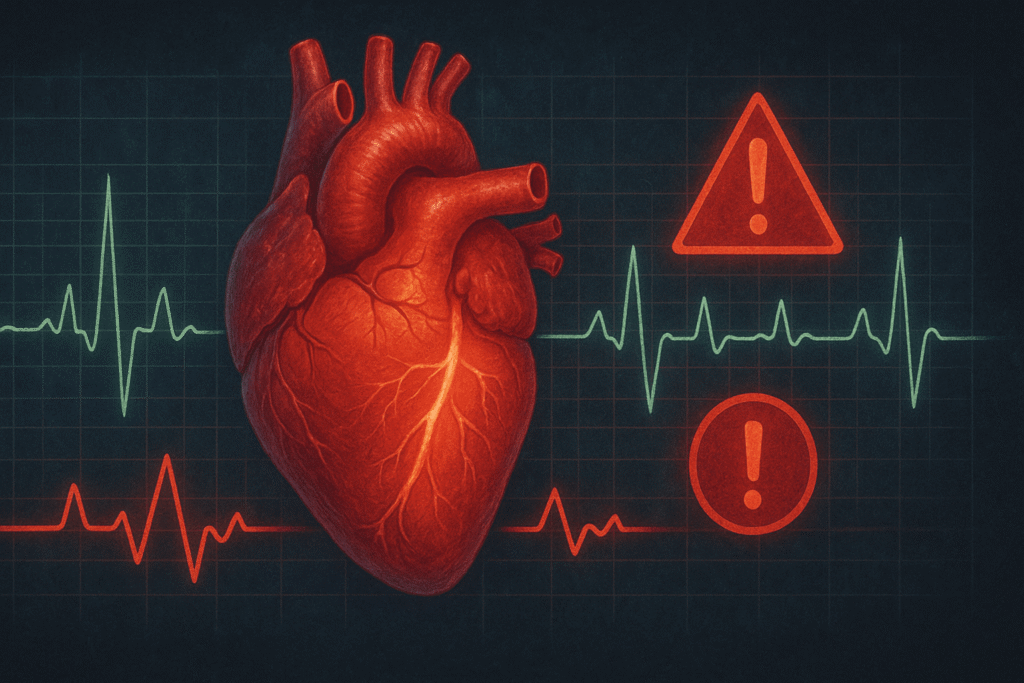
Alcohol Mixing: A Lethal Combination
Combining energy drinks with alcohol creates a particularly dangerous scenario:
- Masks alcohol intoxication without reducing impairment
- Increases risk of alcohol poisoning
- Leads to dangerous decision-making and risky behaviors
- Causes severe dehydration and electrolyte imbalances
Medication Interactions
Energy drinks can dangerously interact with:
- Blood pressure medications
- Antidepressants and anxiety medications
- Blood thinners
- Diabetes medications
- Heart rhythm medications
Who Should Never Touch Energy Drinks
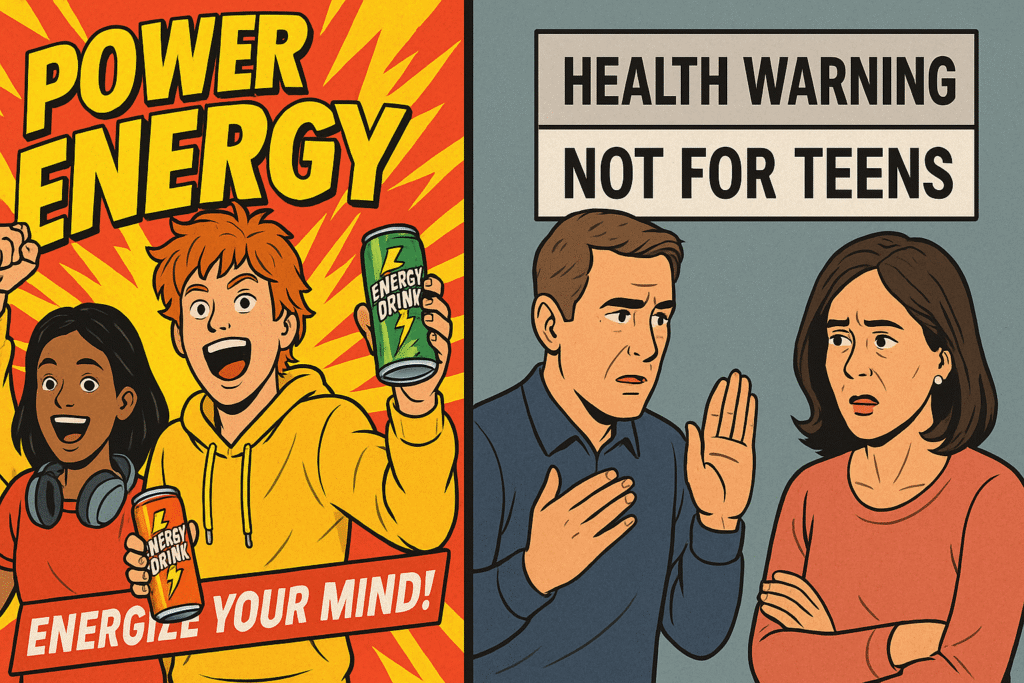
Certain populations face extreme risks and should completely avoid energy drinks:
- Children and adolescents: Developing bodies are particularly vulnerable to caffeine toxicity
- Pregnant and breastfeeding women: Risk of birth defects and developmental issues
- Individuals with heart conditions: Even minor arrhythmias can become life-threatening
- People with anxiety disorders: Can trigger severe panic attacks
- Those taking medications: High risk of dangerous interactions
Healthy Alternatives: Reclaiming Your Natural Energy
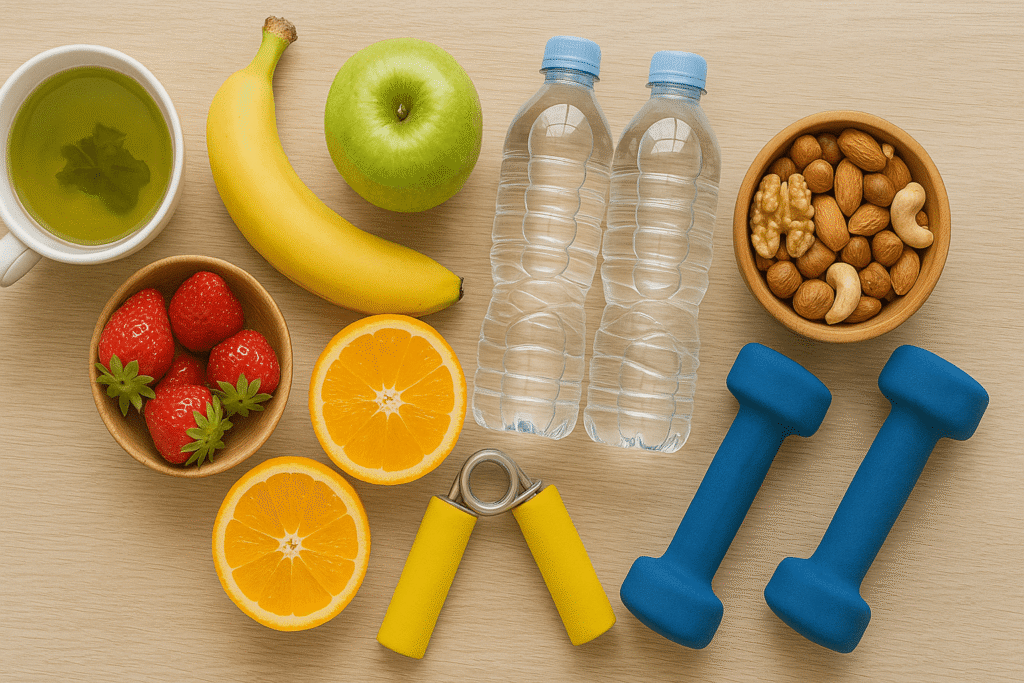
Instead of relying on dangerous energy drinks, consider these safer alternatives:
Natural Energy Boosters
- Quality sleep: 7-9 hours nightly for optimal energy
- Regular exercise: Improves cardiovascular health and natural energy production
- Balanced nutrition: Stable blood sugar prevents energy crashes
- Proper hydration: Dehydration is a major cause of fatigue
Safer Caffeinated Options
- Green tea: Contains L-theanine for smooth energy without jitters
- Coffee: Better regulated with known caffeine content
- Matcha: Provides sustained energy release
- Yerba mate: Natural alternative with additional nutrients
Targeted Supplements
- B-complex vitamins: Support natural energy metabolism
- Iron: If deficient, can significantly improve energy levels
- Magnesium: Essential for energy production at cellular level
- Coenzyme Q10: Supports mitochondrial energy production
Breaking Free: Overcoming Energy Drink Addiction
If you’re currently dependent on energy drinks, here’s how to safely break free:
Gradual Reduction Strategy
- Week 1-2: Reduce consumption by 25%
- Week 3-4: Cut another 25%
- Week 5-6: Reduce to minimal amounts
- Week 7+: Complete elimination
Managing Withdrawal
- Stay hydrated with water and electrolytes
- Get adequate sleep during the transition
- Use natural energy alternatives
- Consider professional help for severe addiction
The Bottom Line: Your Health Is Worth More Than Temporary Energy
Energy drinks represent one of the most dangerous yet socially accepted health threats of our time. The combination of extreme caffeine content, unregulated additives, and aggressive marketing to vulnerable populations creates a perfect storm for widespread health damage.
The evidence is clear: energy drinks are not just harmful – they’re potentially deadly. From cardiovascular catastrophes to neurological damage, from addiction potential to dangerous interactions, these beverages pose risks that far outweigh any perceived benefits.
Take action today:
- Eliminate energy drinks from your diet immediately
- Educate family and friends about these dangers
- Support stricter regulation of energy drink marketing and sales
- Choose natural, sustainable energy sources instead
Your health, your heart, and your future depend on making this crucial change. Don’t let the energy drink industry profit from your well-being – choose life over temporary energy.
Frequently Asked Questions
Q: Can I drink energy drinks occasionally without harm?
A: Even occasional consumption poses risks, especially for individuals with underlying health conditions. The unpredictable nature of caffeine sensitivity and potential interactions makes any consumption risky.
Q: Are sugar-free energy drinks safer?
A: No. Sugar-free versions still contain dangerous levels of caffeine and other stimulants. Artificial sweeteners may pose additional health risks, and recent studies show sugar-free energy drinks are equally harmful to cardiovascular health.
Q: How long does it take to recover from energy drink addiction?
A: Physical withdrawal symptoms typically last 1-2 weeks, but psychological dependence and energy level normalization can take 1-3 months. The timeline varies based on consumption levels and individual physiology.
Q: What should I do if I experience chest pain after drinking energy drinks?
A: Seek immediate medical attention. Chest pain after energy drink consumption could indicate a serious cardiovascular event requiring emergency treatment.
Q: Are there any safe energy drinks on the market?
A: No energy drink is truly “safe” due to high caffeine content and unregulated additives. The safest approach is to avoid them entirely and choose natural energy sources instead.

